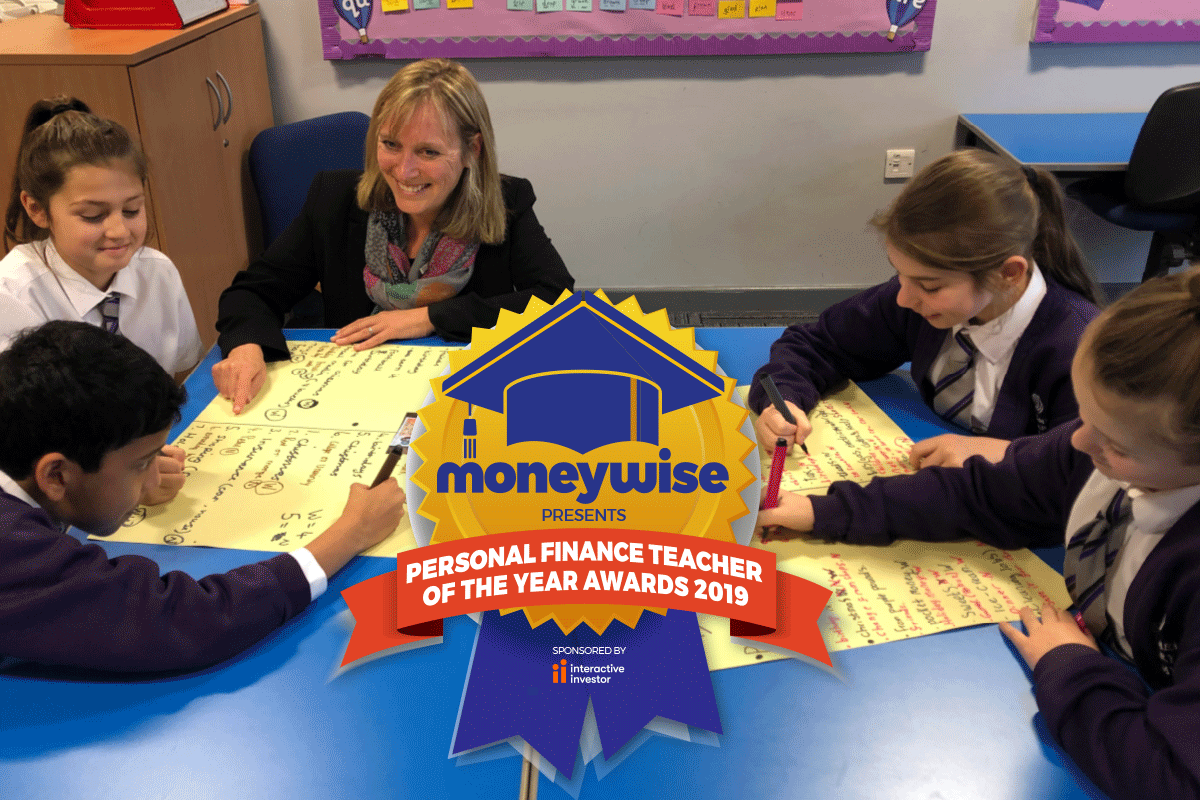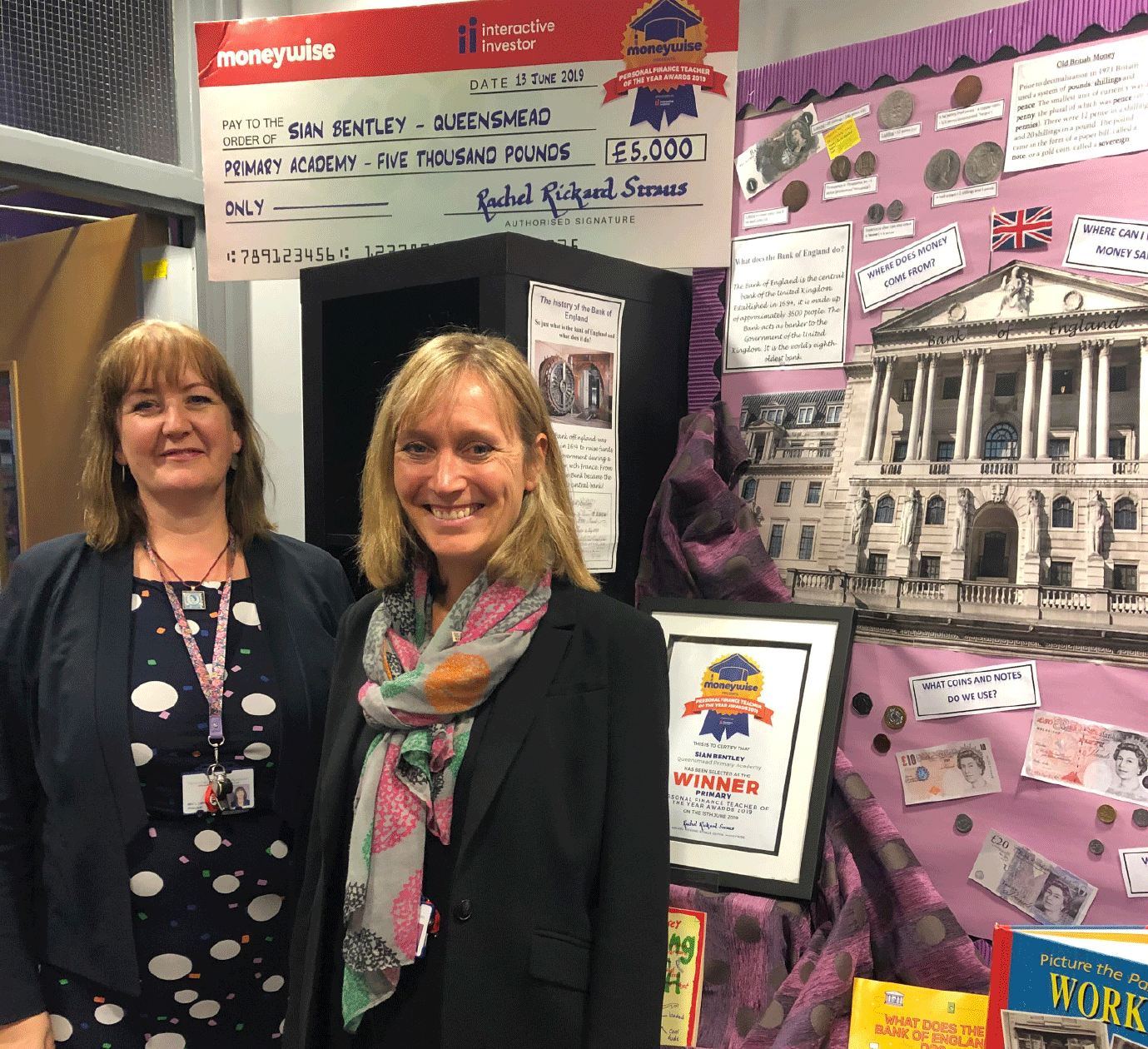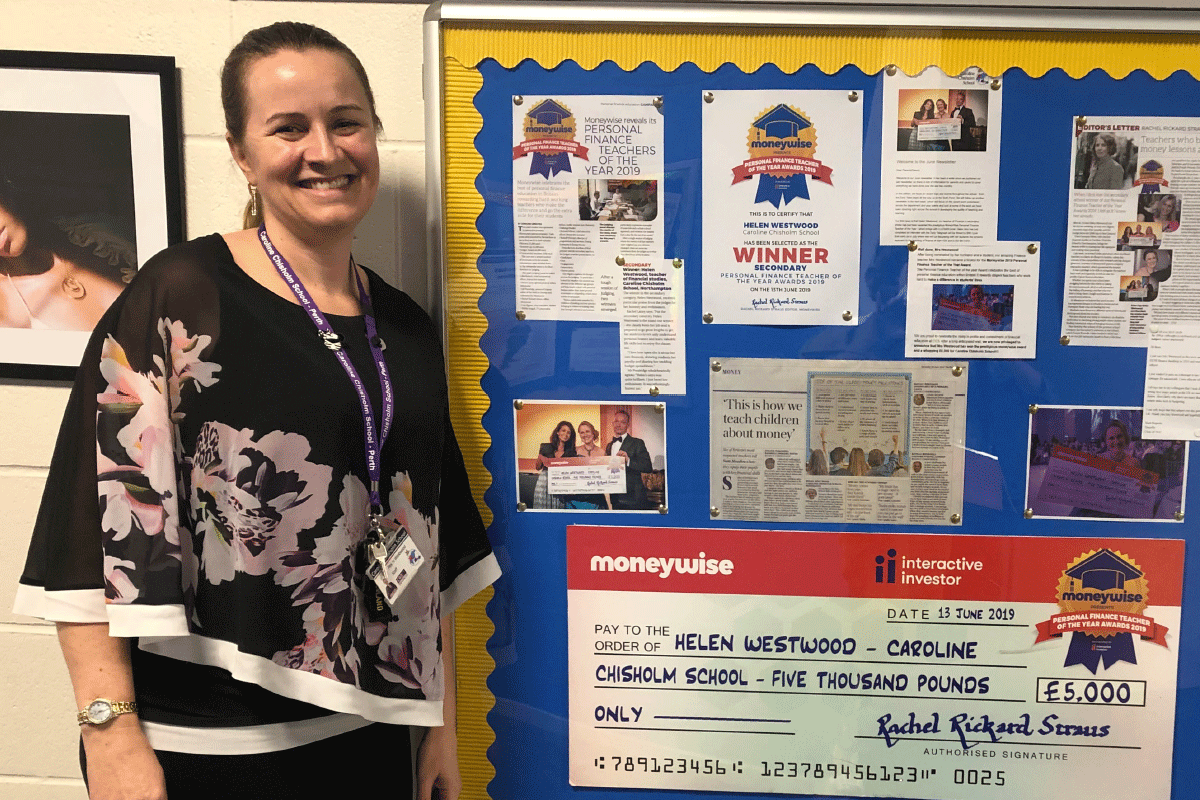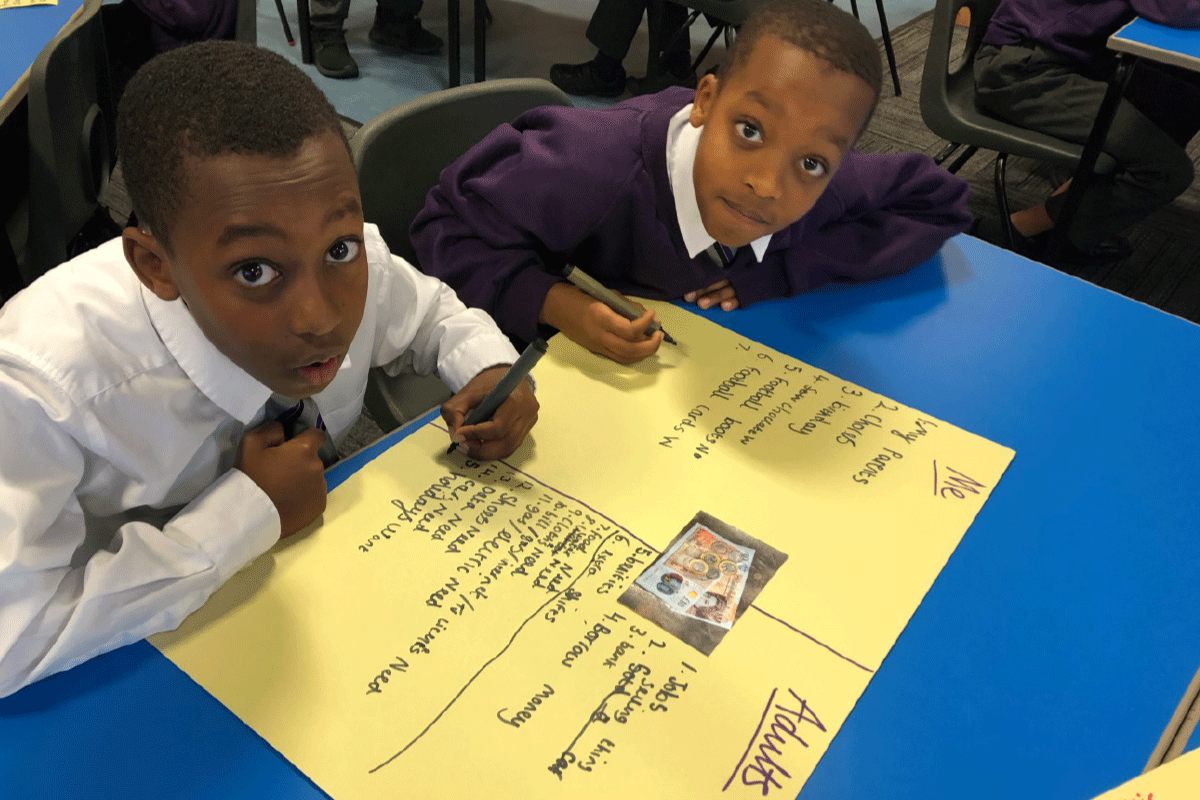Inside the classrooms of the UK’s best money teachers
Moneywise editor Rachel Rickard Straus visits the winners of Moneywise’s annual awards, who each recei…
4th March 2020 09:53
Moneywise editor Rachel Rickard Straus visits the winners of Moneywise’s annual awards, who each received £5,000 from interactive investor to spend in their school

In a classroom in Leicester, 20 hands bolt into the air. I have just asked the class of 10- and 11-year-olds why they think it is important to learn about money. Every pupil has an answer – and many look fit to burst so eager are they to share their ideas.
Ellis, 10, answers: “You should learn now so that in the future you spend wisely.”
Malcolm, 10, adds: “So that you know the difference between credit cards and debit cards. With credit cards, you can spend lower than zero and then you might have to pay interest and you could get into debt.”
Ashan adds: “Then I can tell my mum: ‘Don’t do this with your money’. I asked if she had ever gone into the red and she said ‘no’.”
Rajvir says: “When you are older, you will know about money because you learnt it in school.”
The level of understanding about money is seriously impressive here at Queensmead Primary Academy. But perhaps that’s not surprising. After all, their teacher is Sian Bentley, deputy head and winner of the Moneywise Personal Finance Teacher of the Year Awards 2019.
Moneywise holds these awards every year to find and celebrate the best personal finance teachers in the country.
Shortlisted teachers are invited to attend a black-tie dinner in central London, where the winners are presented with a large £5,000 cheque for their school from award sponsor interactive investor (Moneywise’s parent company).

Liz Latham and Sian Bentley next to a Moneywise display board
I went to visit last year’s winning primary and secondary school teachers to see how they are working their magic and how they are spending their prize money.
The day I visit Queensmead, the excitement is palpable as the highlight of the school week draws nearer. It is time to meet their bank manager.
Children, aged 10 and 11, queue boisterously to proudly present their timesheets to bank manager Rajvir, aged 10, and cash in their earnings. They have been working diligently to earn Purple Pounds – the school currency. Purple Pounds can be spent on items at the school’s ‘emporium’ or for tickets to school events.
“I’ve been working as a translator, says 10-year-old Kornel. “I earn two purple pounds per session and now I have enough to buy slime.”
“I’m a FAB mentor,” adds Ashan, age 10. “That means Friends Against Bullies. When I help, I earn Purple Pounds. I’m saving mine.”
Since launching the school currency, Queensmead has mobilised a workforce of 60 children from year six who all chip in to arrange school events, such as last year’s very successful Halloween disco, and also help younger children with their homework. Some pupils, such as Kornel, who speaks Polish, and Rajvir, who speaks Punjabi and Hindi, translate for parents who don’t speak English as their first language during meetings with teachers, but the main purpose of Purple Pounds is to teach children about money.
“Talking about money runs through everything we do,” explains Liz Latham, the principal of Queensmead, which is part of the Greenwood Academies Trust. “We see it as a moral duty. The school is in the top 10% of most deprived areas nationally and many of the children will come from families who are second or third generation unemployed and where there are difficulties with money at home. We teach them about careers, aspiration and money.”
Next term, the school plans to start taxing Purple Pounds, taking a cut of everyone’s earnings to spend on something everyone can decide on together and enjoy, such as skateboarding lessons or playground equipment.
Deputy Sian Bentley adds: “We create a microcosm of normal society, so when they go out to work the children realise you have to pay tax and understand why.”
Sadly, many schools don’t teach about money at all.
Personal finance is compulsory in secondary schools, but that does not apply to academies or free schools.
Schools that do teach it often do so as part of citizenship lessons, where it jostles for space with other personal, social and health lessons. Some schools crowbar it into maths lessons.

Helen Westwood with Moneywise display board
At Caroline Chisholm School in Northamptonshire, Helen Westwood, winner of the secondary teacher category, is attracting growing numbers of pupils to her standalone financial studies lessons.
Helen received her award for her lessons in which she gets students talking about money by opening up about her own experiences, sharing everything from the budget for her wedding to her own payslips.
“In a maths lesson, you can learn how to calculate a tax bill, but it won’t teach you why you are paying that tax; the difference between wants and needs; or how to work out if you can afford something. And by lumping financial studies with maths, many people who are not confident with maths may confuse that with thinking they are not good with money, so are put off learning how to manage it.”
Helen believes the important of financial studies goes well beyond pounds and pence.
“There is a link between managing money and mental health, relationships and wellbeing,” she says. “Money is one of the most common reasons for relationship breakdown.”
Helen does an exercise with her students in which she asks them to draw their life line and add on to it three aspirations they would like to achieve. “Most say they would like to buy a house, some to go to university, some want to buy a car,” she says.
Then for each aspiration, she asks students to think about how they will achieve it, how much it will cost, and what financial products they may need to get there.
In the year 12 lesson that I join, students are learning how to calculate tax bills, factoring in the tax-free allowance and national insurance costs.
Once they have cracked the numbers, they go on to talk about why people pay income tax, and if the current bands are fair.
“If you earn a lot you’ve probably worked really hard,” says Connie. “I think it’s fair that you should get to keep more than half.”
Bobbi adds: “If you are paying that much tax, you are funding useful things. Say if you earn £150,000, your tax could pay for a police officer.”
Both winning teachers have been able to step up the money lessons at their schools another gear, thanks to the prize money they were awarded.
“The money will allow us to take every child in the school on a school trip,” says Liz. “These will be centred on money, aspiration and careers. Because of the level of deprivation, we struggle to get money for school trips and can’t fund them out of the school budget. We will be able to make these trips free for everyone.”

Pupils at Queensmead learn about wants and needs
Pupils from year six will visit the university; year fives have just been to the National Justice Museum in Nottingham; and year fours will visit an Amazon depot.
The school has also used the money to set up a finance and careers library.
Helen has been spending the money on new classroom resources and plans to use it to benefit pupils across the school.
So if your children are not receiving award-winning personal finance lessons at school, what can you do?
“When you’re looking at prospective schools, ask what they teach about personal finance,” says Helen. “If nothing else, it will add pressure and get them thinking about what they offer.”
She adds: “At home, give children the opportunity to make decisions about money and feel the consequences of buyers’ remorse. I gave my daughter a £10 budget on holiday, and she wanted to buy a horrid plastic toy I knew she’d quickly lose interest in. I wanted to stop her buying it, but I thought, ‘I have to let her learn’.”
She says parents need to “be mindful” of the differences children today face in dealing with money in comparison to their own experiences growing up.
“Today, you can spend with a tap of a plastic card and it is all virtual, so you need to put in extra effort to think about how to monitor a bank balance.”
Sian recommends not shying away from talking to children about money.
“The temptation is to wait until the children are in bed to have an ‘adult conversation’ about whether you can afford a new car, or if you’ll have a family holiday. But try to involve children in this and in understanding what things cost and that if you buy one thing you may not be able to afford another.
“It’s win-win because it stops children pestering for the latest toy when they understand that money doesn’t just come from the hole in the wall, but has to be earned and put there first and budgeted.”
The lessons have hit home for Malcolm, 10, at Queensmead.
“I’m saving up my Purple Pounds and budgeting to buy my family Christmas presents," he says. “It’s the first time I have bought them Christmas presents.”
Meanwhile, at Caroline Chisholm School, Matt, 15, explains: “Learning financial studies is about the skills, rather than a just a qualification. It sets us up for life.”
This article was originally published in our sister magazine Moneywise, which ceased publication in August 2020.
These articles are provided for information purposes only. Occasionally, an opinion about whether to buy or sell a specific investment may be provided by third parties. The content is not intended to be a personal recommendation to buy or sell any financial instrument or product, or to adopt any investment strategy as it is not provided based on an assessment of your investing knowledge and experience, your financial situation or your investment objectives. The value of your investments, and the income derived from them, may go down as well as up. You may not get back all the money that you invest. The investments referred to in this article may not be suitable for all investors, and if in doubt, an investor should seek advice from a qualified investment adviser.
Full performance can be found on the company or index summary page on the interactive investor website. Simply click on the company's or index name highlighted in the article.